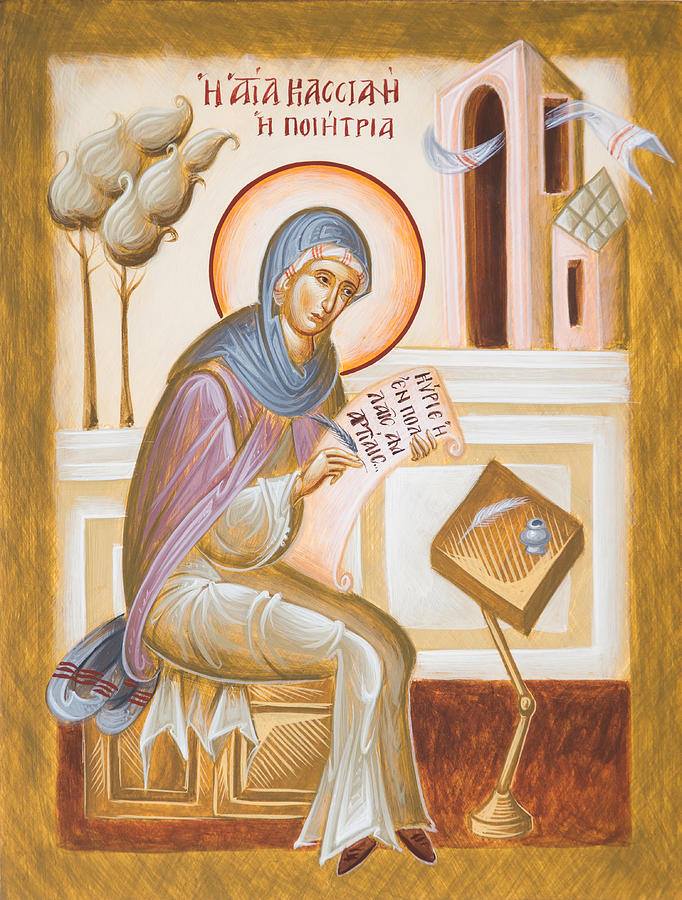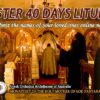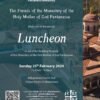
St Kassiani is one of the first composers whose scores are both extant and able to be interpreted by modern scholars and musicians. Approximately fifty of her hymns are extant and twenty-three are included in the Orthodox Church liturgical books. The exact number is difficult to assess, as many hymns are ascribed to different authors in different manuscripts and are often identified as anonymous.
She was born between 805 and 810 in Constantinople into an wealthy family and grew to be exceptionally beautiful and intelligent. Three Byzantine chroniclers, Symeon Metaphrastes, George the Monk (a.k.a. George the Sinner) and Leo the Grammarian, claim that she was a participant in the “bride show” organized for the young bachelor Theophilos the Iconoclast by his stepmother, the Empress Dowager Euphrosyne. Smitten by Kassia’s beauty, the young emperor approached her and said: “Through a woman [came forth] the baser [things]”, referring to the sin and suffering coming as a result of Eve’s transgression. Kassia promptly responded by saying: “And through a woman [came forth] the better [things]”, referring to the hope of salvation resulting from the Incarnation of Christ through the Theotokos. According to tradition, the dialogue was:
“-Εκ γυναικός τα χείρω.” (Ek gynaikós tá cheírō)”- Kαι εκ γυναικός τα κρείττω.” (Kaí ek gynaikós tá kreíttō)
His pride wounded by Kassia’s terse rebuttal, Theophilos rejected her and chose Theodora as his wife. Tradition says that in his later years the Emperor Theophilus, still in love with Kassiani, wished to see her one more time before he died, so he rode to the monastery where she resided. Kassiani was alone in her cell, writing her Hymn when she realized that the commotion she heard was because the imperial retinue had arrived. She was still in love with him but was now devoted to God and hid away because she did not want to let her old passion overcome her monastic vow. She left the unfinished hymn on the table. Theophilus found her cell and entered it alone. He looked for her but she was not there; she was hiding in a closet, watching him. Theophilus felt very sad, cried, and regretted that for a moment of pride he rejected such a beautiful and intellectual woman; then he noticed the papers on the table and read them. When he was done reading, he sat and added one line to the hymn; then he left. The line attributed to the Emperor is the line “those very feet whose sound Eve heard at the dusk in Paradise and hid herself in fear”. Kassiani emerged when the emperor was gone, read what he had written and finished the hymn.
THE HYMN OF KASSIANI THE NUN – 4th Plagal Tone
Glory to the Father, and to the Son, and to the Holy Spirit, now and ever, and to the Ages of Ages. Amen.
The woman who had fallen into many sins recognizes Thy Godhead, O Lord. She takes upon herself the duty of a myrrh-bearer and makes ready the myrrh of mourning, before Thy entombment. Woe to me! saith she, for my night is an ecstasy of excess, gloomy and moonless, and full of sinful desire. Receive the sources of my tears, O Thou Who dost gather into clouds the water of the sea; in Thine ineffable condescension, deign to bend down Thyself to me and to the lamentations of my heart, O Thou Who didst spread out the Heavens. I will fervently embrace Thy sacred feet, and wipe them again with the tresses of the hair of my head, Thy feet at whose sound Eve hid herself for fear when she heard Thee walking in Paradise in the cool of the day. O my Savior and soul-Saver Who can trace out the multitude of my sins, and the abysses of Thy judgment? Do not disregard me Thy servant, O Thou Whose mercy is boundless.




